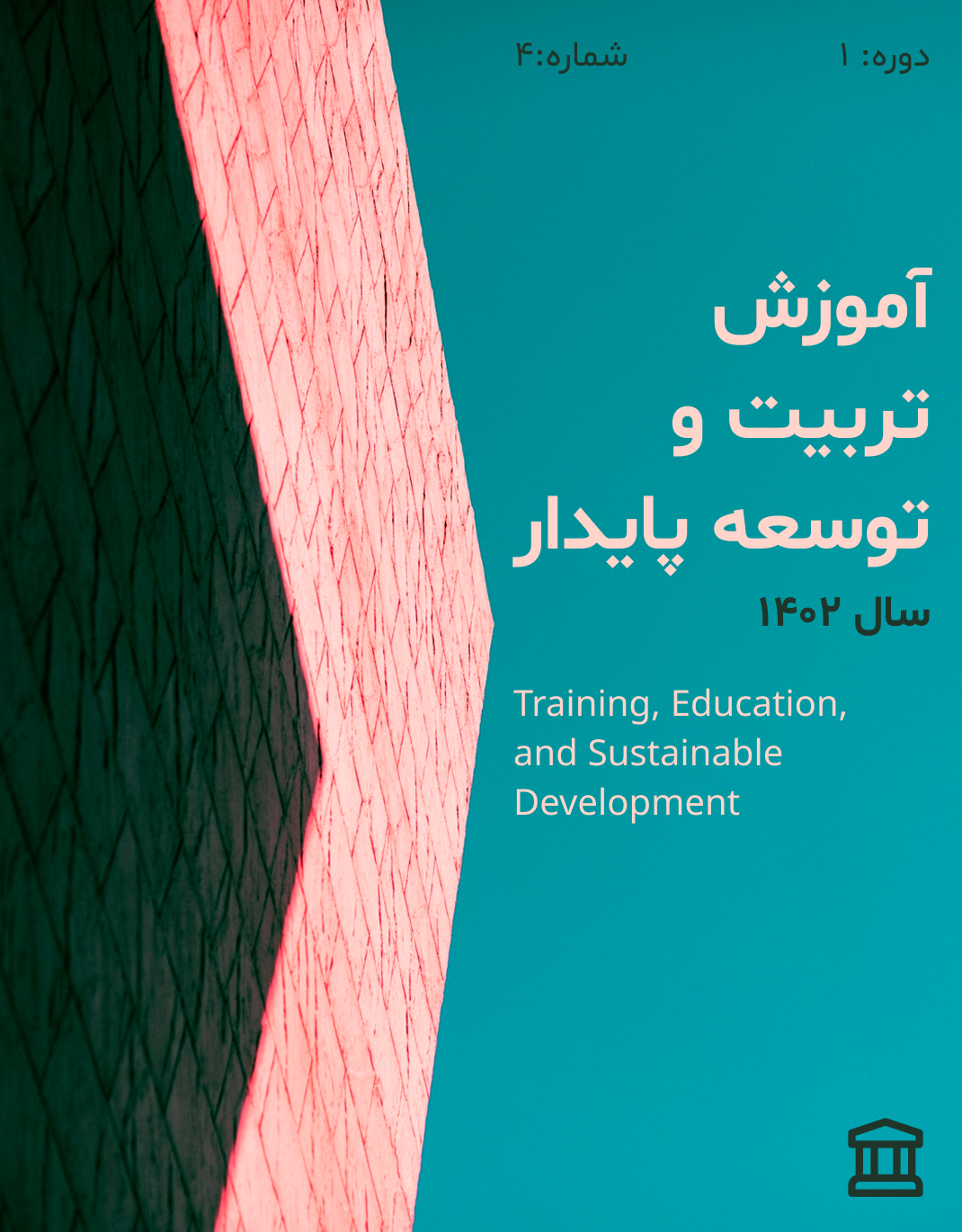کاربرد هوش مصنوعی در کیفیت آموزشی مدارس
کلمات کلیدی:
هوش مصنوعی, سامانه هوشمند BI, شاخصهای مدیریت آموزشی, کیفیت آموزش, مدارس هوشمندچکیده
هدف پژوهش، ارائه مدل مناسبی برای پایش شاخصهای کیفیت آموزشی مدارس از طریق سامانههای هوشمند با درنظرگرفتن شرایط آموزشی و ظرفیتهای دانشآموزی در ایران، با مطالعه موردی آموزشوپرورش استان مازندران است. پژوهش از نظر هدف کاربردی، از نظر شیوه گردآوری دادهها توصیفی، و از نظر نوع دادهها ترکیبی (کیفی و کمی) است. دادهها با استفاده از روش فرامطالعه و فراتحلیل بر پایه مرور بیش از ۳۰ مقاله علمی در زمینه سامانههای تحلیل شاخصهای آموزشی هوشمند جمعآوری شد. پس از استخراج تمها و مقولههای اصلی، پرسشنامهای میان ۱۲۰ نفر از نمونه آماری توزیع شد و تحلیل عاملی تأییدی با نرمافزار PLS انجام گرفت تا اعتبار مدل پیشنهادی سنجیده شود. نتایج نشان داد که ۱۲ شاخص از ۵ مقوله اصلی شامل انگیزه، مشارکت، شفافیت، رشد، بهینهسازی، بهرهوری، یادگیری، شخصیسازی، محیط تعاملی، عدالت آموزشی، مهارتآموزی و کیفیت آموزشی، بهطور معناداری بر بهبود فرآیند یادگیری و توسعه مدیریت هوشمند تأثیرگذار هستند. ضرایب مسیر بالاتر از ۰/۷ و آماره t بیش از ۱/۹۶ برای تمامی متغیرها، بیانگر برازش مناسب مدل بود. همچنین، ضرایب تعیین (R²) برای سازههای درونزا بین ۰/۷۴ تا ۰/۸۱ گزارش شد که نشاندهنده قدرت پیشبینی قوی مدل است. بهرهگیری از فناوری هوش مصنوعی در نظام آموزشی میتواند به ارتقای کیفیت یادگیری، افزایش عدالت آموزشی، و بهبود فرآیندهای مدیریتی در مدارس منجر شود. این نتایج بیانگر ضرورت توسعه زیرساختهای هوشمند و آموزش نیروی انسانی برای تحقق مدیریت آموزشی نوین مبتنی بر داده است.
دانلودها
مراجع
Abgaryan, H., Matevosyan, A., & Asatryan, S. (2023). Revolutionary Changes in Higher Education with Artificial Intelligence. Modern Issues of Pedagogy and Psychology, 10(1), 76. https://doi.org/10.24234/miopap.v10i1.454
Aghaziarati, A. (2023). Artificial Intelligence in Education: Investigating Teacher Attitudes. Aitechbesosci, 1(1), 35-42. https://doi.org/10.61838/kman.aitech.1.1.6
Ahmad, S. F. H., Alam, M. M., Rehmat, M., Irshad, M., Arraño-Muñoz, M., & Ariza-Montes, A. (2023). Impact of artificial intelligence on human loss in decision making, laziness and safety in education. Humanities and Social Sciences Communications, 10(1), 1-14. https://doi.org/10.1057/s41599-023-01787-8
Akhlakpour, M. (2023). The impact of “Artificial Intelligence-based Recommendation System” on educational developments. Journal of Sociology of Communication, 12(3). https://ensani.ir/fa/article/568193/
Al Darayseh, A. (2023). Acceptance of artificial intelligence in teaching science: Science teachers' perspective. Computers and Education: Artificial Intelligence, 4, 100132. https://doi.org/10.1016/j.caeai.2023.100132
Aliabadi, R. (2023). Transdisciplinary AI Education: The Confluence of Curricular and Community Needs in the Instruction of Artificial Intelligence. 137-151. https://doi.org/10.1007/978-981-99-7947-9_11
Amir Hosseini, F., & Khajir, Y. (2023). Artificial Intelligence Strategies for Higher Education Systems. Foresight, Higher Education, and Sustainable Development, 2(2), 64-76.
Annamalai, N., Ab Rashid, R., Hashmi, U. M., Mohamed, M., Alqaryouti, M. H., & Sadeq, A. E. (2023). Using chatbots for English language learning in higher education. Computers and Education: Artificial Intelligence, 5, 100153. https://doi.org/10.1016/j.caeai.2023.100153
Annus, N. (2023). Weigh the Pros and Cons of Using Artificial Intelligence in Education. International Journal of Science, Engineering and Technology, 11(3). https://www.ijset.in/wp-content/uploads/IJSET_V11_issue3_385.pdf
Arbabi, R. (2023). The role of artificial intelligence in technological education and training. Journal of Sexual and Psychological Disorders, 1(4). https://www.spdjournal.ir/article_200426.html
Baidoo-anu, D., & Owusu Ansah, L. (2023). Education in the Era of Generative Artificial Intelligence (AI): Understanding the Potential Benefits of ChatGPT in Promoting Teaching and Learning. Journal of AI, 7(1), 52-62. https://doi.org/10.2139/ssrn.4337484
Thompson, J. (2022). Artificial intelligence in education: Trends, challenges, and future directions. Journal of Educational Technology and Innovation, 15(2), 45-67. https://dergipark.org.tr/en/download/article-file/4143191
Ubah, A. E., Onakpojeruo, E. P., Ajamu, J., Mangai, T. R., Isa, A. M., Ayansina, N. B., & Al-Turjman, F. (2022). A Review of Artificial Intelligence in Education. 2022 International Conference on Artificial Intelligence of Things and Crowdsensing (AIoTCs),
Wan, Y. (2022). Design and Practice of Artificial Intelligence in Physical Education System. 418-423. https://doi.org/10.2991/978-94-6463-044-2_53
Xue, Y., & Wang, Y. (2022). Artificial Intelligence for Education and Teaching. Hindawi Wireless Communications and Mobile Computing, 2022, Article ID 4750018. https://doi.org/10.1155/2022/4750018
Yang, H., & Kyun, S. (2022). The Current Research Trend of Artificial Intelligence in Language Learning: A Systematic Empirical Literature Review From an Activity Theory Perspective. Australasian Journal of Educational Technology. https://doi.org/10.14742/ajet.7492
Yang, W. (2022). Artificial Intelligence education for young children: Why, what, and how in curriculum design and implementation. Computers and Education: Artificial Intelligence, 3. https://doi.org/10.1016/j.caeai.2022.100061
Zhao, J., & Fu, G. (2022). Artificial Intelligence-Based Family Health Education Public Service System. Frontiers in psychology, 13. https://doi.org/10.3389/fpsyg.2022.898107
دانلود
چاپ شده
ارسال
بازنگری
پذیرش
شماره
نوع مقاله
مجوز
حق نشر 1402 سید عزت اله محمدی (نویسنده); سیداحمد قاسمی; حامد عباسی نامی (نویسنده)

این پروژه تحت مجوز بین المللی Creative Commons Attribution-NonCommercial 4.0 می باشد.


